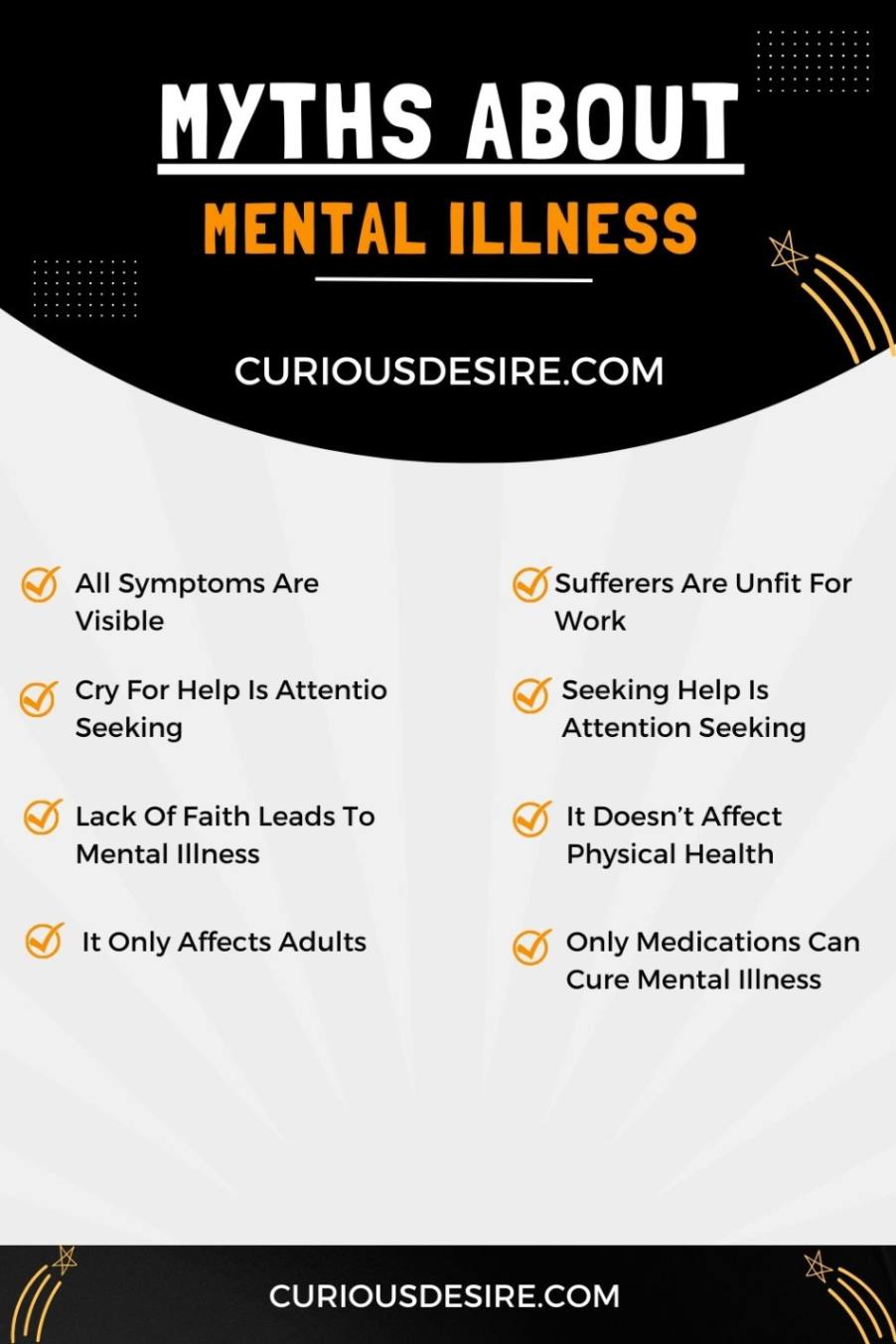Do you know that 46% of people who take their own lives have a known mental illness?
It is crucial to address the myths about mental illness urgently.
Let’s shake off the misconceptions, have an honest conversation, and paint a clearer picture of what dealing with mental illness is really like.
- Symptoms of mental illness are always visible
- Mental Illnesses are rare
- Children do not experience mental illnesses
- People suffering from mental illnesses are unfit for work
- Mental health and Physical health are not correlated

Myth 1: Signs of Mental Illness Are Always Visible
Why This Myth Exists:
This myth about mental illness persists due to a lack of information and our ability to rely on stereotypes when discussing mental health. Unlike physical illnesses that may have visible symptoms like a fever or a rash, the signs of mental health issues are most of the time subtle and can be easily overlooked.
Debunking The Myth:
This illusion that just like physical illness all the symptoms of mental illness are visible is entirely wrong. Some people show visible signs such as behavioral changes, and mood swings while some might be doing their tasks, smiling around while fighting a battle within
Famous Indian Philosopher Krishnamurti said:
“It is no measure of mental health to be well adjusted to a profoundly sick society”
According to the World Health Organization, 1 out of 4 people suffer from mental illness. Quite alarming.

Myth 2: People Struggling With Mental Health Are Unfit for Work
Why This Myth Exists:
Yet another myth surrounding mental illness is that often people battling mental illnesses are lazy. They are often considered unfit for work. Historical misconceptions and a few symptoms of the illness have given rise to this myth.
People battling a war within their minds are unable to perform their tasks to their full potential. This creates a notion that they are lazy.
Debunking The Myth:
The fact is people struggling with mental illness are constantly fighting a battle in their head which makes it quite difficult for them to swiftly carry out their daily tasks. It’s crucial to stress the fact that mental health struggles do not inherently equate to a person’s professional competence or ability to contribute meaningfully to the work.
Various influential figures are struggling with mental health and also making a mark in their respective fields. Emma Stone, a popular Hollywood actress, who has been quite vocal about her challenges with mental illness has a successful Hollywood career. She even won an Academy Award for her remarkable performance in “La La Land”.
This goes on to prove that people with mental illness are fully capable of working, just like those without any mental disorder.
Myth 3: Cry for Help Is Attention-Seeking
Why This Myth Exists:
We unfortunately live in a world where mental health is still considered a trivial issue. People don’t have ample knowledge about the things one has to go through while combating mental illnesses therefore, people asking for help are classified as attention-seekers.
It’s crucial to reject this myth about mental illness to show support for people navigating through this illness.
Debunking The Myth:
It’s important to recognize that mental health concerns are legitimate medical conditions that can profoundly impact your well-being. The less apparent nature of mental illnesses often leads to misunderstandings and doubt.
Unlike physical ailments, the symptoms of mental illness are not always visible.
Please note, that when someone opens up about their struggles, it is an attempt to express their internal suffering, not a call for attention. Rather than dismissing them as attention-seekers, let’s give them our undivided attention. By speaking up they can find support and when we hear with compassion, it reassures them that they are not alone.
“What mental health needs is more sunlight, more candor, and more unashamed conversation.”
Myth 4: Seeking Medical Assistance Is Weakness
Why This Myth Exists:
About 70% of young children and adults do not get themselves treated for mental illness. The reason is this deeply ingrained misconception that people who seek medical aid for their mental illness are considered weak. In some cultures, seeking help for mental health issues is viewed as a personal failure or a source of shame.
Debunking The Myth:
Seeking medical assistance for mental health is not a declaration of incompetence but a recognition of the ability to embrace vulnerability. Willingness to confront challenges head-on is a sign of profound courage, don’t let people tell you otherwise.
Always remember, seeking help for mental illness is no different from seeking help for physical ailments!

Myth 5: Lack of Faith Leads to Mental Illness
Out of all the myths about mental illness, this has to be the most nonsensical one.
Why This Myth Exists:
This is one of the prevalent myths about mental illness. It stems from cultural and religious narratives that intertwine morality, spirituality, and mental well-being.
Faith can provide temporary solace to you however, it is essential to acknowledge that mental health is influenced by genetics, environment, and life experiences.
Debunking The Myth:
Attributing mental illness to a lack of faith is pure nonsense, and it is quite essential to debunk this myth about mental illness to promote inclusivity. Physical, Biological, and Environmental factors lead to mental illness, it has nothing to do with spirituality.
Mental health issues are common in people regardless of their religious beliefs.
Myth 6: Mental Illness Does Not Affect Physical Health
Why This Myth Exists: This myth exists because of:
- Stigmas surrounding mental health
- Lack of understanding about the mind-body connection
- Mental health primarily involves emotions
This myth is not only false but also harmful as research shows a strong connection between mental and physical health.
Source: WFAA YT channel Debunking The Myth: The connection between mind and body can help us understand the relationship between physical and mental health. It also assists us in debunking baseless myths about mental illness.
Anxiety and depression can show up as shallow breathing, persistent sweating, dizziness, and headaches.
In serious cases, these conditions can also have a detrimental impact on cardiovascular health. The impact of mental health on the immune system can not be taken lightly. It adversely affects the ability of the immune system to fight diseases.
Myth 7: Mental Illness Can Only Be Cured by Medication
Why This Myth Exists:
In the past, mental health treatments were often limited, and people had very little knowledge about therapy, meditation, and mental health exercise therefore medications became more widely available and only accepted treatment for mental illnesses.
Debunking The Myth:
Medications can be a valuable component of treatment for some individuals, but a comprehensive approach includes a range of factors, including therapy, lifestyle modifications, and support networks.
Medications alleviate symptoms by influencing neurotransmitters in the brain. However, they do not address the root causes or provide individuals with the coping mechanisms for long-term mental well-being.
Therapy on the other hand, therapy plays a crucial role in helping understand, and manage emotions, thoughts, and behaviors. Moreover, lifestyle factors significantly impact mental health. Nutrition, exercise, sleep, and stress management are integral to mental well-being.
Myth 8: Mental Illness Only Affects Adults
Why This Myth Exists:
The myth that only adults suffer from mental illness is both misleading and harmful, as it undermines the reality of mental health challenges among children.
While it is true that adults commonly experience mental health issues, it is essential to recognize that mental illness can affect people of all ages.
Debunking The Myth:
Children are not immune to mental health disorders. Studies have shown that mental disorders can manifest in the early years of life, with many conditions, such as anxiety, depression, and ADHD.
From navigating social pressures and academic expectations to dealing with family issues and biological changes, children encounter a multitude of stressors that can contribute to mental health issues. Without proper support and understanding, these challenges can worsen mental disorders.
To Conclude, Myths About Mental Illness
The importance of mental health should be highlighted time and again. Events and seminars should be conducted on this topic where the myths about mental illness should be put to rest. We observed a surge in mental illnesses among people after the coronavirus pandemic. People fighting this illness often hesitate to seek help which only results in the worsening of the condition.
10th October is celebrated as World Mental Health Day worldwide.
There are numerous platforms and resources available to support individuals going through mental illness. These platforms debunk myths about mental illness and offer a range of services, including online counseling, peer support, educational resources, and crisis intervention. Better Help, Regain, and Faithful Counselling, are a few among many.
Please seek help if you’re struggling because Mental Health Matters!
Mental Illness Myths FAQs
1. What are some lesser-known symptoms of mental illness?
Some lesser-known symptoms of mental illness may include disturbances in sleep patterns, changes in appetite, and physical aches and pains.
2. Can mental illness affect memory?
Yes, certain mental health conditions, such as depression and anxiety, can affect memory and cognitive function.
3. Can we recover from mental illness?
It is entirely feasible to overcome mental health issues, and a large number of individuals have successfully done so, particularly with the help of support. Although your symptoms may resurface periodically, once you have identified the most effective self-care practices and treatments, you can manage them effectively.
4. Can spiritual practices aid in treating mental illness?
For some people, spiritual practices, such as meditation, prayer, and mindfulness, can provide a sense of comfort, resilience, and coping mechanisms in managing mental health conditions. However, these practices should not be considered a replacement for professional treatment.
5. Does mental illness affect personal relationships?
Mental illness can strain personal relationships due to the challenges of managing symptoms, communication difficulties, and the stigma associated with mental health conditions.
6. Which mental disorder is most common in women?
According to research, depression is the most commonly reported mental health condition among women, with twice as many women experiencing it at some point in their lives compared to men. It is crucial to have a deep understanding of its symptoms, diagnosis, and treatment due to its high prevalence.
7. What are some ways to support a loved one with mental illness?
Offering non-judgmental support, listening with empathy, providing practical assistance, and encouraging professional help-seeking are all important ways to support a loved one with mental illness
8. Can Mental Illness be prevented?
While some risk factors for mental illness, such as genetics cannot be prevented, early intervention, education, and access to resources can help reduce the likelihood of developing certain mental health conditions.
9. Is there a connection between nutrition and mental health?
Nutrition plays a crucial role in supporting mental health. A balanced diet that includes essential nutrients, such as omega-3 fatty acids and B vitamins, can positively impact mood and cognitive function.